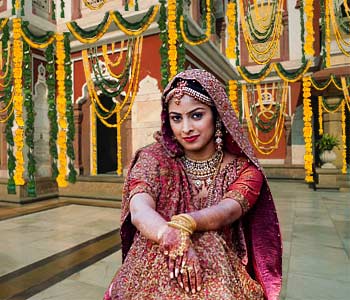 |
Marwari Wedding
Weddings are very elaborate in the Marwari community, wedding rituals stretching for days on end. Marwaris prefer to match the horoscopes of the bride and the groom taking the help of their family astrologer. They select the bride and the groom from their own community.
Pre-wedding ceremonies
- Tika (engagement) ceremony or betrothal is held in the bride groom's house and the bride does not take part in the ceremony. The function is attended only by the male members of the family. The bride's brother applies a tilak on the groom's forehead to confirm the future relationship.
- Griha shanthi and Ganapathi sthapana is a very important ceremony in any Marwari wedding and is held just a couple of weeks before the wedding. The ceremony is held separately at both the bride's and the groom's house, an idol of Lord Ganesha is installed in the house and puja is performed by the family priest. All other ceremonies are celebrated only after this ceremony.
- Pithi dastoor/ ban ceremony - Turmeric and sandal paste is applied for the bride and the groom in their respective houses. This ceremony is very elaborate in the bride's house, the bride dresses in the traditional Rajasthani attire called poshak (orange in color). The bride has to walk under a silk cloth canopy carried by four women from the same family. The women hold the corners of the silk cloth and guide the bride to the ladies gathering where the paste is applied on her. After this ceremony, the bride and the groom cannot leave their house until the wedding ceremony.
- Mehfil is an essential part of the Marwari wedding, and is held during the evenings. Mehfils are held separately for the men and women folk. The women folk dress elaborately and dance to the tunes of traditional Marwari songs. The bride and the groom are seated in their respective mehfils and are allowed to take part in the dance occasionally.
- Janev ceremony is one where the groom is dressed like an ascetic and is given the choice of family life and ascetic life. The groom pretends to take up the ascetic life while the maternal uncle of the groom convinces the groom to take up family life.
- Palla dastoor containing clothes, jewelry and gifts for the groom to wear on the wedding day is brought to the groom's house by the bride's relatives.
- Toran - The groom hits the toran tied in the bride's house with a neem stick, this ceremony is named as the "toranachar". They believe that this ceremony wards off the evil eyes. The groom is welcomed by the bride's mother by applying tilak and performing aarti.
- Jaimala - The initial step to the wedding, the bride and the groom exchange garlands with each other
Marwari Wedding ceremony
- Granthi-bandhan - The cloth around the groom's waist and the dupatta of the bride are knotted to indicate the union of the bride and the groom.
- Paanigrahan - The groom takes the bride's hands in his signifying the future they have ahead.
- Pheras - The groom and the bride go around the sacred fire four times in the mandap and three times at the entrance.
- Ashwahrohan - The bride puts her feet on a grinding stone and indicates that the bride will face the future challenges with courage. The bride's brother places puffed rice in the sister's hands. She passes it to the groom and later offers it to the sacred fire; this ceremony signifies the brother's good wishes for his sister.
- Vamang-sthapana and sindurdaan - The groom requests the bride to sit on his left hand side indicating that he has placed her in his heart. He then fills the partition on her head with vermillion or sindur.
- Saptapadi - The bride and the groom walk seven steps together signifying that they will walk together all their lives. Seven sentences of promise are said by both the bride and the groom.
- Aanjhala bharaai - The father-in-law of the bride puts a bag full of money in the bride's lap. The bride gives a part of this money to her sister-in-law (husband's sister) and her husband. After this the bride and the groom leave the mantap.
- Paharavani - The groom is made to sit on a new cloth and a tika is applied on his forehead. The bride's side womenfolk take him for the fun-filled shloka session where the groom is asked to recite poems. After this the bride breaks an earthen lamp in the dahaleez (porch of her hose) and proceeds to her in-laws house along with her husband.
- Bidai - A coconut is placed under the wheels of the car and the bride lifts the veil covering her face for the first time in front of her husband and the husband gives his wife a gift on this occasion.
Post-wedding ceremonies
- Grihapravesh - After the bride and groom reach the groom's house, grihapravesh is performed along with various other puja's.
- Pagelagni - This ceremony is conducted the day after the grihapravesh, the bride still under her veil is introduced to all the family members who in turn give her gifts.
The bride usually wears the typical Rajasthani poshak consisting of a Ghaghra, blouse, and duppatta. The color of the dress is red, bright yellow, orange or pink. The bride is adorned with lots of jewelry especially a rakhri (a globular piece of jewel hanging from the forehead), timaniyaan (a choker studded with uncut diamonds), chooda (a set of ivory and gold bangles), hanging earrings, bajuband or gold and stone-studded armlets, gold anklets, bichhiya or gold toe-rings, and nath or the stone-studded nose-ring.
The groom in a traditional Marwari wedding wears achkan or the long coat in golden color. A saffron color turban is worn along with a churidhar and regal shoes. Marwari wedding feast is a purely vegetarian affair
|

















